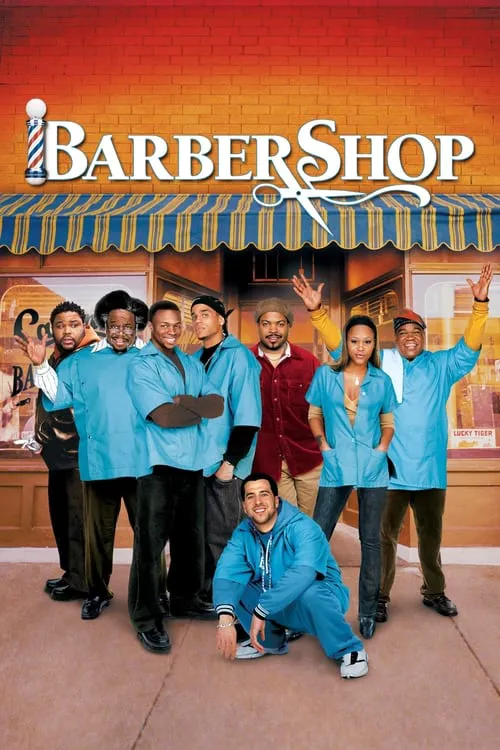Barbershop

Plot
In the gritty, yet vibrant south side of Chicago, a small barbershop stands as a beacon of community and camaraderie. For years, it was a staple of the neighborhood, a place where men could come to share stories, seek advice, and get a shave and a haircut. But beneath the surface of its bustling activity, the shop was struggling to stay afloat. The owner, Eddie, had passed away, leaving his son Calvin to take the reins. Calvin, a young man with a passion for rap music and a dream of becoming a successful artist, had no interest in running a barbershop. To him, it was a burden, a reminder of the life his father had chosen. He had bigger aspirations, and the shop represented everything he wanted to escape. For Calvin, the barbershop was a relic of the past, a place where time stood still while the world moved on. Despite his feelings, Calvin knew he had to do something with the shop. He couldn't let it fall into disrepair, couldn't let the memories of his father fade away. But he had no money, no experience, and no desire to take on the responsibility. It was then that he decided to sell the shop to a local loan shark, Louis G, a sly and cunning businessman who saw the potential for profit in the struggling barbershop. The sale was a bitter pill for Calvin to swallow. In one swift transaction, he had sold his family's legacy, the one thing that reminded him of his father. He felt a pang of regret and guilt, knowing that he had let his father's dreams go up in smoke. But he rationalized his decision, telling himself that he had made the smart choice, the one that would set him free. As time passed, Calvin began to notice changes in his life. He was no longer a part of the barbershop community, no longer a member of the tight-knit group of men who had become like a second family to him. He missed the camaraderie, the laughter, and the sense of belonging. He began to feel lost and aimless, as if he had abandoned a part of himself. Meanwhile, Louis G had big plans for the shop. He had always wanted to revamp it, to make it the go-to spot for young, trendy men. He brought in flashy new decor, modernized the equipment, and hired a team of young, hip barbers. The shop began to attract a new crowd, one that didn't know about the shop's rich history or the relationships that had been forged there. But beneath the surface, the barbershop was still a place of community and connection. The new barbers, despite their modern looks and attitude, were still committed to the old-school values of the shop. They still cared for the customers, still took the time to listen and advise. And the customers, despite the changes, still came back for the same reasons they always had - for the sense of belonging, the sense of being part of something greater than themselves. As Calvin watched the shop thrive without him, he began to see things in a different light. He realized that his father's vision had been bigger than he had ever imagined. The barbershop wasn't just a business; it was a symbol of community, of love, and of legacy. He began to regret his decision to sell the shop, to realize that he had let go of something truly special. The turning point came when Louis G began to push the shop to the limits of what was acceptable. He started charging high prices, cutting corners on quality, and treating the barbers like disposable employees. Calvin realized that the shop was being run into the ground, that the new owners were only interested in making a quick buck. He knew he had to do something, but he wasn't sure what. As the conflict between Calvin and Louis G came to a head, the community of the barbershop began to rally around their favorite spot. They stood up to Louis G, refusing to go along with his plans. They reminded him that the shop was more than just a business, that it was a part of the fabric of their community. And in the end, it was their voices that swayed Calvin, that made him realize the error of his ways. Calvin confronted Louis G, refusing to let him continue to destroy the shop. He demanded that the shop be returned to its original owners, and to his surprise, Louis G agreed. The community of the barbershop welcomed Calvin back with open arms, and he realized that he was meant to be a part of it, to carry on his father's legacy. As Calvin took the reins of the shop once again, he vowed to keep his father's vision alive. He worked hard to restore the shop to its former glory, to rebuild the community that had been lost. He brought in new barbers, men who shared his passion for the shop and its history. And slowly but surely, the shop began to thrive, once again becoming a beacon of community and connection in the south side of Chicago. For Calvin, the journey had been a difficult one, but it had also been a transformative one. He had learned the value of legacy, of community, and of following one's dreams. He had seen that the barbershop was more than just a business; it was a part of him, a part of his family's story. And he had realized that sometimes, the things that seem like burdens can actually be the greatest gifts of all.
Reviews
Recommendations




